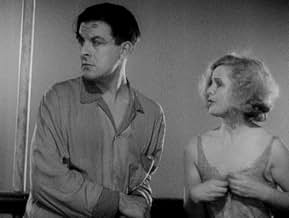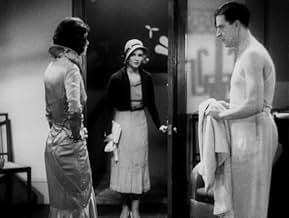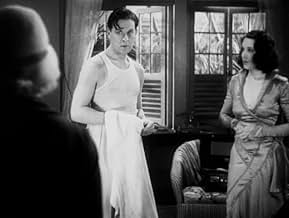Adicionar um enredo no seu idiomaBelieving that an unexpected inheritance will bring them happiness, a married couple instead finds their relationship strained to the breaking point.Believing that an unexpected inheritance will bring them happiness, a married couple instead finds their relationship strained to the breaking point.Believing that an unexpected inheritance will bring them happiness, a married couple instead finds their relationship strained to the breaking point.
- Direção
- Roteiristas
- Artistas
- Ship Steward
- (não creditado)
- Colonel
- (não creditado)
- Mrs. Porter
- (não creditado)
- Man Eating on London Underground
- (não creditado)
Avaliações em destaque
The first five minutes is a montage of dreary office life in 1930s London - a superb homage to King Vidor's THE CROWD. This establishes the setting of a bored suburban young couple in want of excitement. Then they get it and to quote the old adage: be careful what you wish for because it might come true!
This is so different to most films of this period, certainly compared with American films in terms of story. Possibly because The Depression was so much worse in America, Hollywood pictures tended to be either uplifting aspirational stories or preachy sermons warning of the perils of ambition. In England, life in the 1930s was for most, actually a little better than it was in the 1920s so this picture isn't reacting to the shock of The Depression. In typical English style, this just laughs at those who think they're better than they are. At the time however it was seen as a little bit too cruel and unsympathetic which really harmed its box office appeal.
What makes this so enjoyable today (besides Joan Barry, whom I might have mentioned a few times is gorgeous!) is its glimpse into the life of normal, everyday people in 1932 and how remarkably similar it was to today - except for the weird accents of course! If however it was just a brilliant time capsule it would be interesting but because this is so well made, so naturalistically acted and filmed and edited with such energy it's thoroughly entertaining. Unlike a lot of early thirties pictures, it's not stagey, stationary or slow and the screenplay by Mr and Mrs Hitchcock, basing the characters a little on themselves makes Fred and Emily feel very real and genuine.
Although ultimately the truth that money doesn't buy you happiness is revealed, it's a warm, witty and charming film. It has a refreshingly different vibe to American films of the time with its topless showgirl, it's explicit adultery and disregard for received morality. It's quintessentially English, quaintly 1930s but somehow also feels quite modern......and Joan Barry is lovely!
Some reviewers have complained about the use of placecards - actually I think this was intended to enhance the comedic aspect of the film. Take a look back two years at Hitccock's "Blackmail" for comparison. This film was originally intended and partially shot silent. Hitchcock neither used placecards nor did he need them to convey his points in Blackmail.
There are some classic bits of Hitchcock camera-work here. During meaningless conversations, meaningless framing is used seemingly to mock the action of the film itself. The classic example of this is a pair of symmetrically arranged scenes where two of the main characters are walking to and from a social event on a cruise ship, blathering away, while the camera follows their feet and Emily's (Joan Barry) dragging dress. Jarring, yet humorous!
Joan Barry's stunning and adorable portrayal of Emily -our protagonist- is a bit of a perverse male fantasy - she is beautiful, intelligent (when she needs to be) and undervalues herself terribly - so her loyalty to a husband deserving of much much less is a bit exasperating. She is married to a whining, opportunistic, bore named Fred, and becomes romantically attracted to the charming Commander Gordon. The story boils down to this: Emly and Fred lead a life which causes Fred to whine (but this, it becomes clear later, is genetic and part of the fiber of his being).
One night, they receive an early inheritance and decide to take a cruise around world and live the good life. Fred, however, remains the miserable lout he was at the beginning, but adds to his follies alcoholism, philandering, and seasickness. Money does not cure everything - a bit of cliché, but, with Rich and Strange, it doesn't end there.
All of the acting is quite good, though as some have noted, it is sometimes over-the-top (perfectly appropriate for a comedy, IMO).
Você sabia?
- CuriosidadesThe title "Rich and Strange" is an allusion to words of Ariel's song in William Shakespeare's "The Tempest": "Full fathom five thy father lies, / Of his bones are coral made, / Those are pearls that were his eyes: / Nothing of him that doth fade, / But doth suffer a sea-change / Into something rich and strange."
- Erros de gravaçãoIn an early scene, Emily is shown using a marker to draw a caricature of herself into a photograph with Commander Gordon. The photo is shown again two more times in the movie, and each time the drawing is slightly different.
- Citações
Emily Hill: Love is a very difficult business, Mr. Gordon... You'd be surprised. It makes everything difficult and dangerous... You know, i don't think love makes people brave like it says in books... I think it makes them timid. I think it makes them frightened when they're happy and sadder when they're sad... You see, everything's multiplied by two... sickness, death, the future.
- Versões alternativasWhen originally released theatrically in the UK, the BBFC made cuts to secure a 'A' rating. All cuts were waived in 2000 when the film was granted a 'U' certificate for home video.
- ConexõesFeatured in Perspectives: Jonathan Ross: Alfred Hitchcock - Made in Britain (2013)
- Trilhas sonorasFor He's a Jolly Good Fellow
(uncredited)
Traditional
Source music
Principais escolhas
Detalhes
- Tempo de duração1 hora 50 minutos
- Cor
- Mixagem de som
Contribua para esta página




























